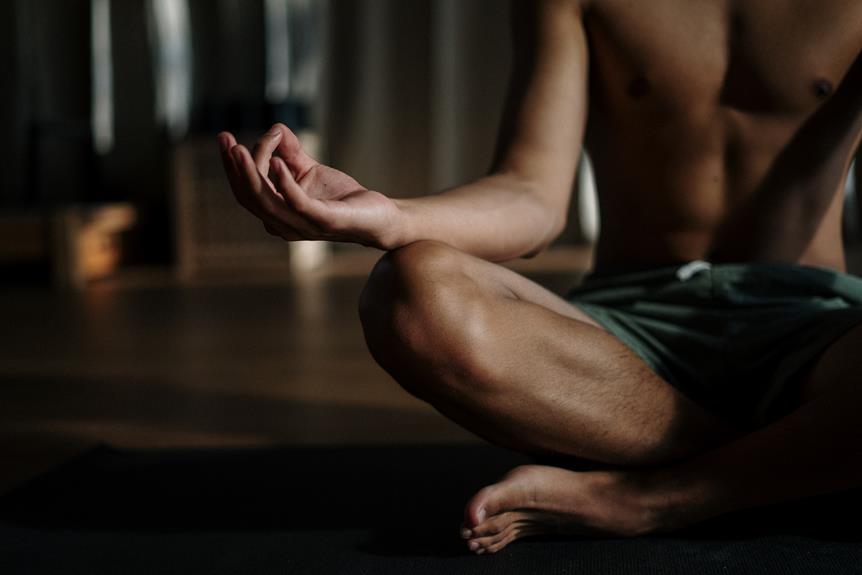Ready to take your meditation practice to the next level? Discover the transformative power of keeping a meditation journal. By jotting down your thoughts, insights, and experiences, you'll deepen your connection with yourself and the present moment.
Uncover hidden patterns, track your progress, and gain valuable insights along the way. Get ready to embark on a journey of self-discovery and mindfulness as you integrate journaling into your meditation practice.
Let's begin!
Benefits of Keeping a Meditation Journal
One of the key benefits of keeping a meditation journal is that it helps you track your progress and identify patterns in your practice. By recording your thoughts, emotions, and experiences during meditation, you can gain insight into your journey and see how far you've come.
This journaling process allows you to reflect on your practice and celebrate your achievements, improving your motivation to continue.
Moreover, a meditation journal can help you improve your focus. By writing down distractions or wandering thoughts that arise during your meditation sessions, you become more aware of them and can work towards minimizing their impact.
Additionally, keeping a meditation journal can also be a powerful tool for reducing stress. Expressing your thoughts and feelings on paper can provide a sense of release and clarity, helping to alleviate tension and promote relaxation.
Setting Up Your Meditation Journal
Start by finding a small notebook or journal that you can dedicate solely to your meditation practice. This will help create a sense of organization and focus for your journaling journey.
Choose a journal that resonates with you, whether it's a simple notebook or a beautifully designed journal.
Once you have your journal, start by setting it up in a way that suits your needs. You can divide it into sections for different meditation techniques, intentions, or themes. This will allow you to easily navigate your journal and find specific entries when you need them.
Additionally, consider incorporating reflection prompts into your journal. These can be questions or prompts that encourage deeper exploration of your meditation practice and help you gain insights. Reflecting on your experiences can enhance your understanding and growth.
Effective Journaling Techniques for Meditation
To get the most out of your meditation journal, consider using a combination of writing techniques and strategies that can deepen your practice and enhance your self-reflection.
One effective technique is to use mindfulness practices while journaling. As you write, focus your attention on the present moment, noticing the sensations in your body and the thoughts and emotions arising. This can help bring a sense of calm and clarity to your writing, allowing you to explore your meditation experiences in a more meaningful way.
Another technique is to incorporate self-reflection techniques into your journaling practice. Take the time to ask yourself questions about your meditation sessions, such as what insights or challenges arose, and how you can apply these lessons to your daily life.
Tracking Your Progress and Insights
Keep recording your observations and insights as you continue your meditation practice. This will help you track your progress and gain a deeper understanding of your experiences.
Take some time each day to reflect on your meditation sessions. Consider what went well, what challenges you faced, and any new insights you gained.
Writing prompts can be a helpful tool for self-reflection. They can guide you in exploring specific aspects of your practice, such as focusing on the breath or cultivating loving-kindness. Use prompts like 'What emotions did I notice during today's meditation?' or 'How did my mind wander, and how did I bring it back to the present moment?'
Integrating Journaling Into Your Meditation Practice
As you continue your meditation practice, consider incorporating journaling to deepen your reflection and enhance your overall experience. Journaling can be a powerful tool to cultivate mindful reflection and emotional awareness.
Here are four ways to integrate journaling into your meditation practice:
- Start with a gratitude journal: Begin your meditation session by writing down three things you're grateful for. This practice can help shift your mindset to a more positive and appreciative state.
- Reflect on your meditation experiences: After each meditation session, take a few moments to jot down your thoughts and feelings. This reflection can deepen your understanding of your practice and help you track your progress over time.
- Explore your emotions: Use your journal to explore and express any emotions that arise during your meditation. This process can enhance your emotional awareness and provide valuable insights into your inner world.
- Set intentions: Before each meditation session, set an intention for your practice. Write it down in your journal and revisit it afterward to see how your intention influenced your experience.
Frequently Asked Questions
Can I Use Any Type of Journal to Keep a Meditation Journal?
Yes, you can use any type of journal to keep a meditation journal. However, using a dedicated meditation journal has its benefits. It helps you stay organized, track progress, and create a sacred space for your reflections.
How Often Should I Write in My Meditation Journal?
You should aim to write in your meditation journal regularly, ideally every day or at least a few times a week. Consistent journaling provides numerous benefits, including increased self-awareness and a deeper understanding of your meditation practice.
Is It Necessary to Include Specific Details About My Meditation Sessions in My Journal?
Including specific details about your meditation sessions in your journal is not necessary, but it can greatly enhance your journaling practice. It helps you track progress, identify patterns, and deepen your understanding of your meditation experience.
Can I Use My Meditation Journal to Write About Other Aspects of My Life?
Yes, you can use your meditation journal to write about other aspects of your life. It's a great way to explore your thoughts and emotions. Journaling benefits your overall well-being and there are different journaling techniques to try.
Can I Use Digital Apps or Online Platforms for Keeping a Meditation Journal?
Yes, you can use digital apps or online platforms to keep a meditation journal. However, consider the benefits of a handwritten journal, such as improved focus and a deeper connection to your thoughts and emotions.
Conclusion
So there you have it, fellow meditators! Keeping a meditation journal can be a powerful tool to enhance your practice. By documenting your experiences, insights, and progress, you create a space for self-reflection and growth.
Remember, Rome wasn't built in a day, and neither is a strong meditation practice. So, grab your pen and journal, and let the ink flow as you embark on this transformative journey of self-discovery. As they say, 'The pen is mightier than the sword.'








